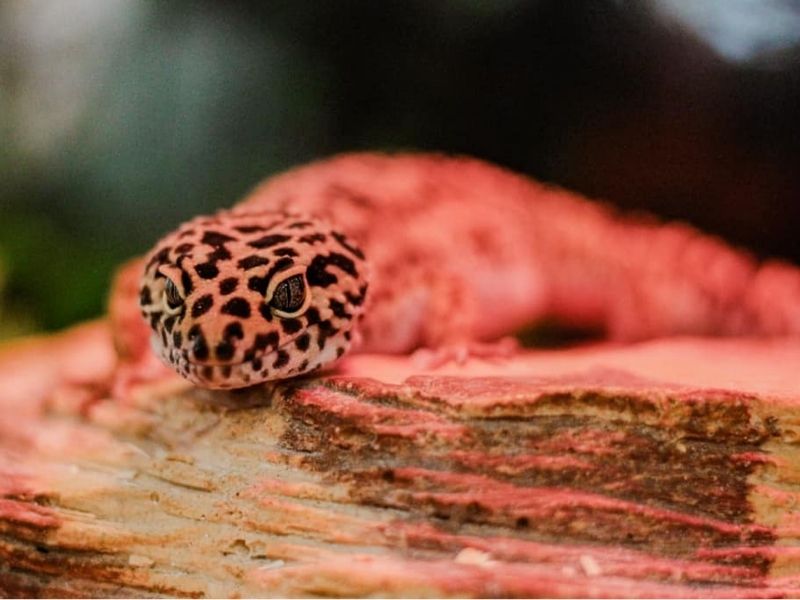Leopard geckos make great pets just like the average household hamster. They are however very different when it comes to meals and dieting. Leopard gecko feeding varies from their eating frequencies to quantity.
Young leopard geckos require extra care when feeding but as they grow, they become more low maintenance. Feeding frequency in leopard geckos changes with age and at a certain time during their life span, they may stop feeding for various reasons.
In this article, we are going to look at some of the reasons why a leopard gecko might stop eating and for how long they can go without food.
Do leopard geckos go without food and water?
Leopard geckos can go without food for 1-2 weeks and the geckos with thick tails easily go through this time without eating. During this time, the geckos will use the fat stored in their thick tail for survival. This is an adaptation form of the reptiles to help them during the cold season.
Leopard geckos can only go for a maximum of 72 hours without drinking water and become dehydrated after 3 days. Dehydration in leopard geckos is a serious thing that has a high possibility of death. While it is normal for the gecko to go for a week or two without eating, always ensure the gecko is supplied with fresh drinking water in its tank every day.
Is it normal for leopard geckos to refuse food?

It is normal for a leopard gecko to stop eating for a few days. However, this should not continue for more than two weeks, some of the signs to watch out for as a pet owner to ensure the gecko eating habit is normal are:
Temperature
Leopard geckos are highly dependent on their environment for warmth or to cool down. In order for a gecko to digest food, it requires a temperature of 88-93 degrees Fahrenheit. When the temperature drops and the gecko gets cold, it will not be able to digest food and this discomfort will eventually make the gecko stop eating.
It is important to measure the temperature of the tank floor where the gecko will be laying on and adjust it if it is not the right degree.
The low temperature might also cause respiratory illness which may lead the leopard to stop eating.
Read more: Leopard Gecko Temperature: What’s the Ideal Temperature?
Type of feeding
As a new pet owner, it is important to know what the leopard gecko was eating at the pet store or in its previous environment. Leopard geckos can be picky feeders and changing their diet might cause the gecko to stop eating altogether.
It is important to note that leopard geckos prefer eating live and moving insects and if you feed your gecko dead insects, it is likely they will stop eating.
Parasites in geckos
When your leopard gecko continuously shows loss of appetite and prolonged fasting, this might be a sign of parasites. Parasites in geckos have no cure and the gecko will lose weight and which will lead to an untimely death. The only way to determine whether your leopard gecko has parasites is to get a faecal test done at the reptile vet.
Parasites also spread fast in cohabiting geckos and it is best to separate the geckos if this is suspected followed by a thorough clean of the gecko tank.
How long can a leopard gecko go without food?
A leopard gecko can go from 10 days to 2 weeks without eating and during this time, it will be using the fats stored in its tail. At the time when the gecko stops feeding, it is very important for the pet owner to be providing the leopard gecko with clean drinking water. The geckos can go for a long time without eating but they get dehydrated after a matter of 3 days.
Leopard geckos stop eating for some normal reasons while some might need a visit to the reptile vet. When the geckos stop eating, they will be safe for some time but it is always important to ensure the gecko is free of any illness or injury.
How long can a leopard gecko go without water?
Leopard geckos can only survive without water for 1-3 days. If they go for a longer period without water the geckos easily get dehydrated which leads to possible death. To keep the geckos in good health as a pet owner, you should always provide fresh and clean drinking water every day.
Normal feeding frequency
Leopard geckos below 12 months normally eat frequently and should be fed every day for proper nutrition and steady growth. These baby leopard geckos should eat at least 10 small insects in a day while having clean drinking water in their tank.
Adult leopard geckos are lower maintenance, eating less frequently and go a day or two without eating provided they have drinking water in their tank.
In the case of a sick gecko, you should ensure it is well-fed for a full recovery and better health.
How to encourage a new gecko to eat
In the case where your new gecko has refused to eat, constantly trying to feed the gecko will stress them thus prolonging the starvation. As a pet owner, you should try and assess why the new gecko is not eating and help the gecko adjust.
The gecko might not be familiar with the new environment and might need a little time to adjust. After a day or two, the gecko should be eating.
The new environment might be too cold or too warm for the gecko which causes the gecko to stop eating and as the pet owner, you should adjust the temperature to suit the gecko well.
Geckos are picky with what they eat and sometimes it’s best to encourage your Leopard gecko by feeding them their best food. This will get them back in the eating mood and also feed them a variety of insects to keep the gecko interested.
Will starvation kill my gecko?
Geckos stop eating due to natural reasons and it is normal for the gecko to go without food for some time. Their thick tails store fats that the geckos use during the fasting period and there should not be any reason for worrying.
As a pet owner, you should ensure that the reason your gecko stops eating is because of environmental factors such as low temperature or stress from being bullied by other cohabiting geckos. Always check for any injuries or sickness symptoms that may cause your gecko to stop eating.
If the gecko is in good physical shape and stops eating for a prolonged period of time, a visit the reptile vet will help assess the possible problem.
READ NEXT: Best Foods to Feed Leopard Geckos

